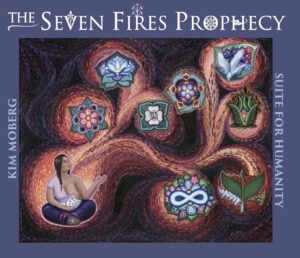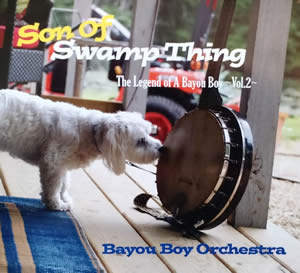 Kim Moberg’s new folk-rock opera The Seven Fires Prophecy centers on an old Native American legend, and the album greatly impresses and intrigues on many levels. This story of ancient peoples in North America and the prophets who guide them provides mystical songwriting material that Moberg and her producer, multi-instrumentalist Jon Evans turn into a multi-track story song. A descendant of the Tlingit tribe, Moberg here recreates the ancient prophecy called “The Seven Fires Prophecy.”
Kim Moberg’s new folk-rock opera The Seven Fires Prophecy centers on an old Native American legend, and the album greatly impresses and intrigues on many levels. This story of ancient peoples in North America and the prophets who guide them provides mystical songwriting material that Moberg and her producer, multi-instrumentalist Jon Evans turn into a multi-track story song. A descendant of the Tlingit tribe, Moberg here recreates the ancient prophecy called “The Seven Fires Prophecy.”
Opening track “The First Fire: Exodus” finds Moberg singing in understated fashion. Her vocal gradually becomes more edgy, assertive, giving this piece a serious build up that allures and involves the listener. There is a coolness in how Moberg’s vocal coasts over an acoustic guitar progression and an Evans electric guitar fuzz droning. This kind of music could inspire a coven of witches to form and begin an otherworldly ritual.
“The Second Fire: Lost” lets Moberg sing in a lighter, girlish approach. Her gentle tone contrasts well with Evans low end electric guitar line. Both vocal and the electric walk hand in hand, maintaining an even pace and down tempo drive. Yet, the tones in voice and instruments suggest a depth of emotion accompanying the walk two characters are taking in this song.
“The Third Fire: The River” gets a lot of color and tone out of Moberg’s voice and acoustic guitar, Rebecca Moberg’s harmony vocal as well as Evans upright bass, electric guitar, tenor guitar, and drums. Each voice and instrument emits a dark, haunting timbre. Three voices make for an enchanting chant. The layering of each instrument playing a brief interval of notes creates a solid tuft of haunted emotions. Together, their timbres all march the listener through a dire circumstance to possible safety.
“The Fourth Fire: Two Faces” uses brittle acoustic and electric guitar notes to convey a perilous void. One prophet speaks of hopeful possibilities. A second prophet foretells only a negative future when newcomers arrive. Lyrically, the song is balanced precariously between voices. The halted emotion in all of the single notes falling from each instrument doubles down on that uncertainty. Moberg sings in an even manner, letting the differing views speak and maintain the tension without the singer tipping her hand.
“The Fifth Fire: The Promise” increases tempo and features edgier guitars. Moberg moves quickly through twisty lyrics and around gritty instrumentation. An intriguing bouncy drone comes from Evans using a Filipino Kubing, a sound that contrasts well with the more dire sounding instrumentation. The harrowing sensation of this song heighten the lyrical action about a people at a crossroads. If they take great risks in abandoning their old ways, they can begin a great glorious future. Moberg and Evans bring to three dimensional life the sensation of being on such a precipice with a driving focus in their lyrics, voices, and musicianship.
“The Six Fire: The Cup Of life” centers on the elders of the native peoples who feel abandoned as the younger generations have moved on to newer visions. Moberg’s sweet voice is softly understated here. She carries a stillness, a well of sorrow as she quietly, gently moves over a sensitive soundscape. What a moody, forlorn backdrop it is, a generation looks back and Moberg and Evans make us feel it.
“Reprise: The Past, The Present” provides an instrumental piece for the listener to have time to take in the emotive grist of the album up to this point. Quick, quirky instrumental lines, bouncy effects, and string waves give it an allure.
“The Seventh Fire: The Crossroad” goes into full, explorative
rock and roll. Complete with drumming, upright bass, percussion, and lead guitar, this piece spreads out a haunted sprawl that Moberg and Evans croon over with a fateful purpose. Evans’ chaotic vibe emanates from his haunted lead guitar, a smoldering phrase that makes one wonder what ignited the fire.
Close out track “The Eighth Fire: Wings Of The Winds” finds Moberg rejoicing that the prophecy of the ancients has been fulfilled. Here, the singer-songwriter lets her gentle vocal glide over orchestral instrumentation and a softer rock band format. She sings in a low key manner, yet her voice is full of emotion, something to be felt as well as heard as she makes her way through this quiet celebration, one that implies peaceful conclusion and logical acceptance.
Moberg accomplishes a great deal on this Seven Fires Prophecy album. Her voice is beautifully self-restrained, serving up plenty of emotion in areas of the story when great emotion could not be denied. Her sustains carry power as well the right emphasis in her story line. Her acoustic guitar playing is nimble, skillful, and always in sympathy with her songwriting. Her wing man, producer and multi-instrumentalist Jon Evan, in his Brick Hill Studio in Orleans, Massachusetts, manages miracles as far as matching the soundscape to Moberg’s story. Appearances by Rachel Moberg and Matthias Bossi hit the listener just right and an appearance of a Filipino Kubing works well. Moberg has certainly done justice to her heritage and to the Tlingit tribe from which she descends.

